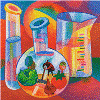Chemical and Biomolecular Engineering, Department of: Papers in Subdisciplines

Papers in Biotechnology
Date of this Version
January 1999
Abstract
A simple, sensitive, rapid (3 min), and highly reproducible solid-phase assay for the detection of proteins in the low nanogram range (4 ng) is described. The assay is based on differential Pon-ceau S staining of the protein spots on nitrocellulose and quantification of the protein- dye com-plexes on lubricated membranes using a densitometer. The dye solution used for protein stain-ing contained 0.1% Ponceau S in 15% phosphoric acid and 10% ethanol. Proteins were directly spotted onto pre- Ponceau S-stained nitrocellulose membranes, crosslinked with glutaraldehyde, rinsed in NaOH, restained with Ponceau S, and finished by rinsing in acid water at pH 3. Dry membranes were lubricated with mineral oil to achieve brightness of the colored spots before scanning with a densitometer at 560 nrn. The assay shows tolerance to extreme acidic and ba-sic buffer conditions and no significant protein-to-protein variations were observed. The effects of detergent contaminants and various other reagents such as polyethylene glycol, mercap-toethanol, and urea were also tested in the assay. The nonionic detergent, digitonin, and the anionic detergent, sodium dodecyl sulfate, up to l%, and Triton X-100 up to 0.25% do not inter-fere with the assay. Efficacy of the assay was tested for five different proteins and the sensitivity was compared with the most widely used method of Bradford's.


Comments
This article was published in Analytical Biochemistry, Vol 270, pp 75-82, 1999. Article ID abio.1999.4057 Copyright © 1999 by Academic Publishers. Published version of the article is available online at publishers website